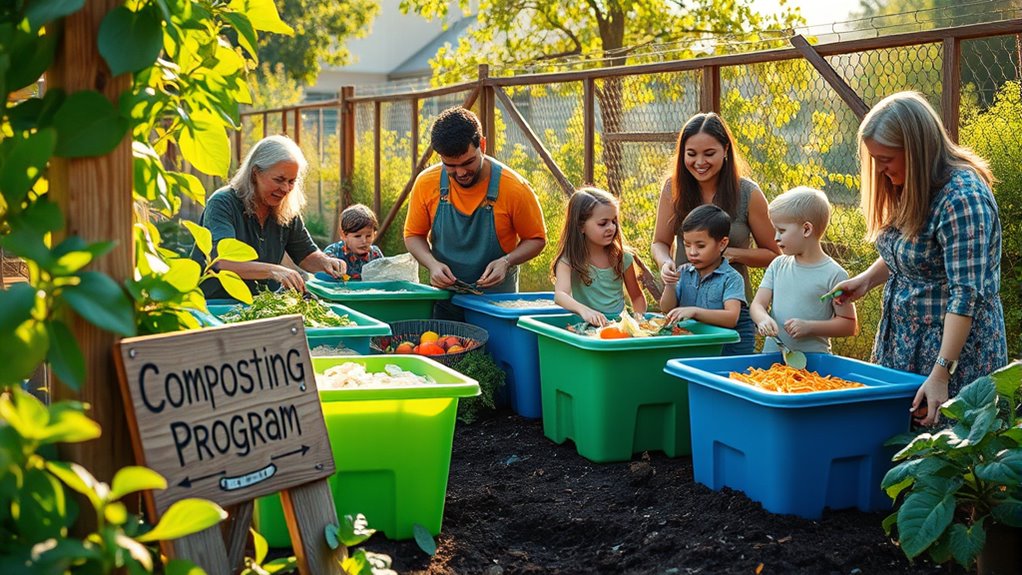To start a community composting program, you’ll want to check your local regulations and identify suitable, allowed materials. Host workshops and provide clear signage to educate neighbors about composting basics. Set up accessible compost stations and partner with local organizations to boost participation. Keep communication open with authorities and adapt your approach based on community feedback. If you want practical tips on designing and maintaining a successful program, you’ll find helpful details below.
Key Takeaways
- Check local regulations and permitted materials to ensure compliance before establishing compost stations.
- Engage the community through educational events, signage, and accessible composting sites to encourage participation.
- Design the program with multiple, conveniently located compost stations and clear instructions for residents.
- Partner with local organizations and authorities to promote sustainability and receive support.
- Regularly monitor, promote, and adapt the program based on feedback to maintain engagement and compliance.

Starting a community composting program can be a rewarding way to reduce waste and build local connections. When you take on this initiative, you’ll find that engaging your neighbors and encouraging urban engagement is key to its success. People living in cities are often eager to participate in sustainable practices, but they need clear guidance and accessible options. By fostering a sense of shared responsibility, you’ll help create a vibrant community that values eco-friendly solutions. To make this work smoothly, understanding and steering composting regulations is essential. Local laws can vary widely, so it’s important to research what’s permitted in your area and ensure your program complies with all relevant ordinances.
First, you’ll want to check with your city’s environmental or waste management department to understand specific composting regulations. Some cities have strict rules about what materials can be composted or where compost bins can be placed, especially in densely populated neighborhoods. You might discover restrictions on outdoor compost piles or requirements for covered bins to prevent pests. Knowing these details upfront helps you design a compliant program that avoids potential fines or shutdowns. It also builds trust with local authorities, who are more likely to support initiatives that follow established guidelines.
Next, you’ll need to engage your community actively. Urban engagement means making composting accessible and appealing to residents of all backgrounds. Host informational sessions or workshops to educate neighbors about the benefits of composting, how to do it properly, and what materials are acceptable. Providing clear signage and step-by-step guides can demystify the process, encouraging more participation. Make it convenient by setting up multiple compost stations around the neighborhood or partnering with local businesses and community centers. The more you promote involvement and make composting easy and rewarding, the more likely your program will thrive.
Frequently Asked Questions
How Do I Secure Funding for a Composting Program?
To secure funding for a composting program, explore various funding sources like local government grants, environmental organizations, and community foundations. You should prepare strong grant applications that clearly outline your program’s benefits, budget, and goals. Reach out to potential sponsors early, and consider crowdfunding campaigns to generate additional support. By actively pursuing diverse funding options and crafting compelling proposals, you’ll increase your chances of obtaining the necessary resources.
What Permits or Legal Considerations Are Involved?
You need to check your local zoning laws to verify your composting site complies, as some areas have restrictions on outdoor activities. Obtain any necessary permit requirements from your city or county government before starting. This might include environmental permits or business licenses if you’re handling waste commercially. Consulting local regulations helps you avoid fines or project delays, ensuring your community composting program operates legally and smoothly.
How Do I Handle Compost Contamination Issues?
To handle compost contamination issues, identify contamination sources like plastics or chemicals and remove them promptly. Prevent contamination by educating volunteers on proper waste sorting, using designated bins, and setting clear guidelines. Regularly monitor your compost for signs of contamination, and adjust your processes as needed. Consistent prevention measures help maintain healthy compost, ensuring it’s safe and effective for community use.
What Are Effective Ways to Engage Local Volunteers?
Imagine planting seeds of change—your success hinges on effective community outreach. To engage local volunteers, you should prioritize clear, inspiring communication that highlights the impact of their efforts. Use volunteer recruitment strategies like social media campaigns, local events, and partnerships with schools or organizations. By fostering a sense of shared purpose, you’ll motivate people to join your cause, creating a thriving community that cares for the environment and nurtures growth.
How Can I Measure the Program’s Environmental Impact?
To measure your program’s environmental impact, track waste reduction by weighing composted materials regularly. Calculate how much you’re decreasing your community’s carbon footprint by analyzing the reduction in landfill waste and greenhouse gases. Keep detailed records of participation and composting volume. Additionally, compare before-and-after data on waste generation. These steps help you quantify the positive effects of your program and demonstrate its contribution to sustainability efforts.
Conclusion
As you start your community composting program, remember that even a small effort can lead to big change. Coincidentally, just last week, a neighbor mentioned their desire to reduce waste—showing you’re not alone in this mission. By taking action now, you’ll turn everyday scraps into nourishing soil, fostering stronger community bonds. So, keep going—you might just inspire others to join, creating a ripple effect that transforms your neighborhood in unexpected, wonderful ways.









